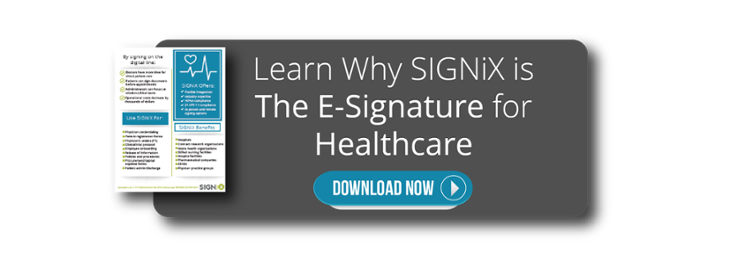Patient engagement is vital to healthcare providers. And, like most challenges today, the right technology can provide a solution that is both efficient and effective. An excellent example is the partnership between tech companies SIGNiX and RELATIENT to tackle patient registration.
In my career, I’ve seen entrepreneurs create new technologies and then look for real world problems that the technology can overcome. This approach, however, is backwards and typically not hugely successful.
A better way is to first identify problems that already exist and then go to the drawing board to seek solutions. Alan Cooper, who many consider the father of user experience design (UX), believes the ideal approach to technology adoption is this “goal directed” method, rather than trying to make existing technologies “fit” an industry’s challenges.
One of healthcare’s biggest challenges is a lack of patient engagement. Many patients miss their appointments, forget to reschedule them or neglect to contact their providers when asked to do so. Through their partnership, SIGNiX and RELATIENT are working to better connect patients to their providers.
When a provider uses the RELATIENT platform that is integrated with SIGNiX, a patient can securely and easily complete, sign and submit paperwork from any internet-connected device, anywhere, at any time. This encourages patients to use their provider’s patient portal—the online, cloud-based platform where patients can access their medical records and appointments or contact their providers. This saves time and ensures patients are ready to receive clinical care immediately upon arrival, in addition to reducing the amount of time that healthcare providers must spend handling paperwork.
When a new technology is introduced in healthcare, there are important compliance regulations that must be met, especially the Health Insurance Portability and Accountability Act (HIPAA). Both SIGNiX and RELATIENT have been vetted and adopted by some of the largest, most demanding healthcare providers and technology companies, and both meet industry compliance standards, including HIPAA.
Because healthcare documents contain sensitive information—such as Social Security numbers, payment information and personal health data—maintaining the security of this information is a top priority. SIGNiX’s Independent E-Signatures™ are tamper-evident, meaning they will indicate if an unauthorized user has altered a document. And the legal evidence of a digital signature is forever embedded into each signed document—proving a document’s integrity for years to come with no reliance on SIGNiX. Due to these capabilities, SIGNiX does not need to store a copy of these confidential documents, further strengthening data privacy.
Why is this type of tech adoption successful? It was created with the end users in mind—both patients and providers—and it increases workplace efficiency, allowing providers to spend more time on what truly matters, patient care.
[Editor’s note: If you’d like to learn more about using e-signatures for healthcare, download this free white paper. To learn more about RELATIENT’s patient engagement solutions, click here.
About Peg Olson: Peg Olson is the founder of jPEG Executive Search, a recruiting firm that specializes in healthcare, technology and financial services. With 20 years of recruiting experience, Peg has dedicated her career to assisting emerging growth companies find the talent they need to grow. Peg has a Bachelor of Arts Degree in English from the University of Denver. She was born and raised in Pittsfield, ME and now lives and works out of Athens, GA. Peg is an early stage personal investor in both SIGNiX and RELATIENT.
To learn more about why SIGNiX is the e-signature for healthcare, download this fact sheet:
%20formatted-1.png?width=2528&height=739&name=SIGNiX%20Logo%20Main%20(white)%20formatted-1.png)

